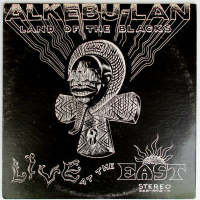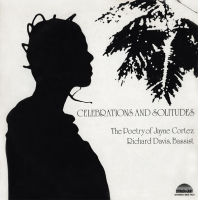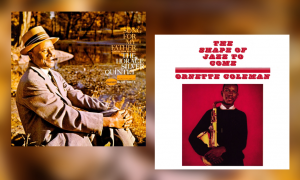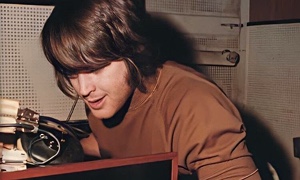Home » Jazz Articles » Building a Jazz Library » Strata-East: Seizing the Time
Strata-East: Seizing the Time

I was listening to John Coltrane, Jimi Hendrix, Pharoah Sanders, Sun Ra, Marvin Gaye, Albert Ayler, Martha & The Vandellas. One way and another, they were all revolutionary.
—Idris Ackamoor
Strata-East was founded by Tolliver and pianist Stanley Cowell in 1971. By the end of the decade, the label had released 58 albums of near-uniform artistic excellence, a remarkable achievement for an independent company run on a shoestring by two musicians with no previous business experience.
Tenor saxophonist Idris Ackamoor came out of the same radical, community-focused zeitgeist and, though he was never formally associated with either Strata-East or the AACM, admired both organisations. In a 2018 interview, Ackamoor said: "Our music emerged alongside the Civil Rights movement. It was all about black consciousness. There was a revolutionary spirit running through African American music. I was listening to John Coltrane, Jimi Hendrix, Pharoah Sanders, Sun Ra, Marvin Gaye, Albert Ayler, Martha & The Vandellas. One way and another, they were all revolutionary. When I grew up, music was about making change happen."
Strata-East and AACM operated with collegiate rather than competitive purpose and it was this, according to Ackamoor, that defined both entities and gave them their fundamental strength. "Earlier generations of African American musicians were raised to be crabs in a bucket," said Ackamoor. "From the 1920s onwards, they were brought up on the idea of the cutting school, where you'd try and best each other in head-to-head jam sessions. 'I'm badder than this cat, I'm badder than that cat.' But my generation felt that the priority had to be unification. Competitive cutting was opposed to unity. It was opposed to 'each one teach one' as the saying went. There was a race war going on in the US. We needed to present a united front."
In London in 2020, the same team spirit is a feature of the alternative jazz scene fostered by Gary Crosby's Tomorrow's Warriors.
In 1974, Strata-East's balance sheet was temporarily boosted by the success of Gil Scott-Heron and Brian Jackson's Winter In America. The album made Billboard's top ten jazz albums chart and breakout single "The Bottle" was a top twenty R&B hit. The discs did not make Strata-East rich—its contracts were weighted in favour of the artists—but it allowed the label to pay some debts and stay solvent for a few more years. Strata-East had become less active by the early 1980s and in 2020 its business is mainly confined to licensing items from its back catalogue for reissue by other labels.
As with Blue Note, you can pick up any Strata-East album you run across and, without needing to play it, be confident it will deliver the goods. The ten albums listed below are an indicative rather than a definitive selection.
 Mtume Umoja Ensemble
Mtume Umoja Ensemble Alkebu-Lan: Land Of The Blacks
1972
Percussionist James Mtume was a bankable songwriter and producer in the 1980s, crafting hits for Stephanie Mills, Phyllis Hyman and other soul / jazz crossover artists with his collaborator, guitarist Reggie Lucas. In the early 1970s, however, Mtume trod a less glossy path in community-orientated spiritual jazz. This live album, recorded at Brooklyn's East Club, features saxophonists Gary Bartz and Carlos Garnett (Mtume played with both in Miles Davis' band) and the Association for the Advancement of Creative Musicians's Leroy Jenkins on violin. Its heady blend of free jazz, funk and radical performance-poetry vividly evokes the black-consciousness informed New York scene in which the music blossomed.
 Shamek Farrar
Shamek Farrar First Impressions
1974
First Impressions is the first of two masterpieces which alto saxophonist Shamek Farrah recorded for Strata-East before going off-radar in the early 1980s. The other is The World Of The Children (1977), co-headlined with pianist Sonelius Smith, whose trippy piano playing is also featured here. First Impressions wins the cigar by a short neck, if only for the title track, which is powered by a bass ostinato that will not be denied. It was played by Milton Suggs, who in 1974 also worked with Byron Morris & Unity, contributing more killer bass to the band's cult hit, "Kitty Bey."
 Pharoah Sanders
Pharoah Sanders Izipho Zam
1973
Izipho Zam was recorded a year after the release of Sanders' tour de force, Tauhid (Impulse!, 1967). Inexplicably, it stayed on the shelf until Strata-East picked it up, by which time Impulse! had released eight more Sanders discs. Tauhid was made with a sextet, Izipho Zam with a group twice that size. The most significant returnee is free-funk guitarist Sonny Sharrock. New faces include pianist Lonnie Liston Smith and vocalist Leon Thomas. Both albums are transitional, between the unrelenting ferocity of Sanders' work with John Coltrane and the more blissed-out albums he went to make with Smith, Thomas and Alice Coltrane.
 JuJu
JuJu A Message From Mozambique
1973
With track titles such as "Freedom Fighter" and "Make Your Own Revolution Now," the debut album from JuJu, a percussion-heavy sextet led by saxophonist Plunky Nkabinde, placed the band firmly on the explicitly politicised wing of spiritual jazz. The music sounds like an angrier version of Pharoah Sanders' contemporaneous albums, though with one hand still activating the melodicism lever. Nkabinde later repositioned the group as a four-on-the-floor funk outfit, variously calling it Oneness Of JuJu and The Space Rangers.
 The Descendants Of Mike And Phoebe
The Descendants Of Mike And Phoebe A Spirit Speaks
1974
A curiosity with serious provenance. Film director Spike Lee's composing and bass-playing father leads a family band through a funk-friendly jazz album dedicated to their slave ancestors, which brims with great musicianship and glowing tunes. Some of the wordless-vocal passages sound uncannily like those on Kamasi Washington's discs. The line-up includes three of Lee's children: flugelhornist Cliff, pianist Consuela and singer Grace, augmented by drummer Billy Higgins. Today, Bill Lee is best known for his soundtracks for Spike Lee's movies Mo' Better Blues, Do The Right Thing and She's Gotta Have It.
 M'Boom
M'Boom Re:Percussion
1973
M'Boom was a nine-piece drums, percussion and marimba and vibraphone ensemble led by bop godfather and political activist Max Roach. The group's lineage goes back to bands led by the Nigerian-born drummer Babatunde Olatunji in New York the late 1950s. Re:Percussion features two lesser known drummer-composers of stellar talent. One is Joe Chambers, who notably propelled bands led by Eric Dolphy, Charles Mingus and Wayne Shorter. The other is Roy Brooks. Brooks' all-but-forgotten album The Free Slave (Muse, 1972) is among spiritual jazz's most outstanding recordings.
 Gil Scott-Heron / Brian Jackson
Gil Scott-Heron / Brian Jackson Winter In America
1974
Strata-East's biggest-selling album came along midway through the label's purple period and helped finance another few years of revolutionary recordings. Despite distribution problems—as an African American-owned independent, Strata-East struggled for attention when up against the majors—popular demand ensured the single pull, 'The Bottle,' became a top twenty R&B hit. Winter In America was a key progenitor of latter-day rap, and Brian Jackson's stripped-down instrumental arrangements remain an object lesson in how to say more with less.
 Jayne Cortez
Jayne Cortez Celebrations And Solitudes
1974
Poet Jayne Cortez's album covers subjects as harrowing as those on Winter In America and then some—including a real-life lynching in New York and the fatal shooting of ten year old African American Clifford Glover by a white undercover policeman in 1973, for which the policeman was acquitted on all charges. She performs in a duet with bassist Richard Davis, who recorded with Eric Dolphy and Rahsaan Roland Kirk among other important jazz musicians—and with Van Morrison, on Astral Weeks (Warner Bros, 1968). For ten years, Cortez was married to Ornette Coleman, and was the mother of drummer Denardo Coleman.
 Billy Harper
Billy Harper Capra Black
1973
A tenor saxophonist of gospel-like fervour, Billy Harper is one of the best-kept secrets of post-John Coltrane jazz. After periods with Gil Evans and Art Blakey, both of whom kept his compositions in their books long after he had moved on, he made this own-name debut. He is accompanied by a septet which includes trombonists Julian Priester and Dick Griffin and drummers Billy Cobham and Warren Smith (augmented on occasion by Elvin Jones). The closing "Cry Of Hunger!" is among the highlights.
 Clifford Jordan
Clifford JordanClifford Jordan In The World
1972
One of Strata-East's first releases, tenor saxophonist Clifford Jordan's sublime In The World was the label's most straight-ahead post-bop outing. Recorded in 1969, it has little overt connection with spiritual jazz. Trumpeters Don Cherry and Kenny Dorham share the frontline, and the rhythm section includes pianist Wynton Kelly. Swinging hard from start to finish, the album sounds, in a good way, like it could have been recorded anytime between the late 1960s and 2020.
Strata-East poster artwork: Ben Connors
Tags
Building a Jazz Library
Chris May
Charles Tolliver
Stanley Cowell
Idris Ackamoor
John Coltrane
Jimi Hendrix
Pharoah Sanders
Sun Ra
Marvin Gaye
Albert Ayler
Martha & The Vandellas
Gary Crosby
Gil Scott-Heron
Brian Jackson
Blue Note
James Mtume
Stephanie Mills
Phyllis Hyman
Reggie Lucas
Gary Bartz
Carlos Garnett
Miles Davis
Leroy Jenkins
Shamek Farrah
Sonelius Smith
Milton Suggs
Byron Morris
Sonny Sharrock
Lonnie Liston Smith
Leon Thomas
Alice Coltrane
Plunky Nkabinde
Billy Higgins
M'Boom
Max Roach
Babatunde Olatunji
Joe Chambers
Eric Dolphy
Charles Mingus
Wayne Shorter
Roy Brooks
Jayne Cortez
Richard Davis
Rahsaan Roland Kirk
Ornette Coleman
Denardo Coleman
billy harper
Gil Evans
Art Blakey
Julian Priester
Dick Griffin
Billy Cobham
Warren Smith
Elvin Jones
Clifford Jordan
Don Cherry
Kenny Dorham
Wynton Kelly
PREVIOUS / NEXT
Support All About Jazz
 All About Jazz has been a pillar of jazz since 1995, championing it as an art form and, more importantly, supporting the musicians who make it. Our enduring commitment has made "AAJ" one of the most culturally important websites of its kind, read by hundreds of thousands of fans, musicians and industry figures every month.
All About Jazz has been a pillar of jazz since 1995, championing it as an art form and, more importantly, supporting the musicians who make it. Our enduring commitment has made "AAJ" one of the most culturally important websites of its kind, read by hundreds of thousands of fans, musicians and industry figures every month.






















